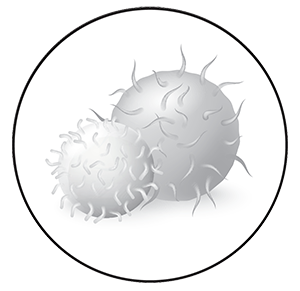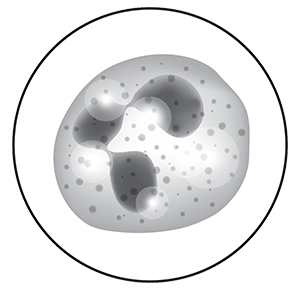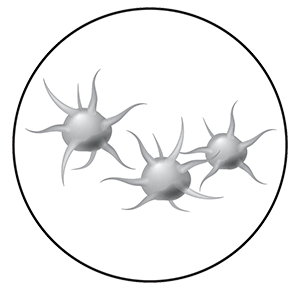Understanding your Blood Work
 Complete Blood Count (CBC)
Complete Blood Count (CBC)
What is a Complete Blood Count and differential?
- A complete blood count is a blood test done by a nurse or phlebotomist
What do complete blood counts measure?
- The level of blood cells in your blood that include red and white blood cells and platelets
What do differentials measure?
- The types of white blood cells you have passing through your blood
Why are blood counts important?
- Shows us how the leukemia and treatment affect your body
- Blood counts may change due to the leukemia itself, the chemotherapy treatment or other reasons Ÿ
- Show us what supportive care treatments, like transfusions or antibiotics are needed if your blood counts are too low or too high
What are the types of blood cells in your blood?
- Red blood cells (measured by hemoglobin)
- White blood cells that include
- Neutrophils, which are a type of white blood cell
- Blasts, which are the leukemia cells
- Platelets
 Red Blood Cells and Hemoglobin
Red Blood Cells and Hemoglobin
- Red blood cells carry oxygen and nutrients to all the cells in your body
- Hemoglobin is a part of the red blood cells that carries the oxygen
- Normal Range: 120-160 g/L
- During treatment: hemoglobin can drop to less than 70 to 80 g/L and will vary for many weeks
- Red blood cell (RBC) transfusions may help to bring your counts up when your hemoglobin is very low
 White Blood Cells (WBC)
White Blood Cells (WBC)
- White blood cells help to fight infection and are an important part of your immune system Normal Range: 4.0-11.0 bil/L
- During treatment: white blood cell count can be very low, it can drop to zero
- When your white blood cell count is low, you are at higher risk of getting infections. You may be given medications to prevent or fight infections.
 Neutrophils
Neutrophils
- Type of white blood cell that fights infection
- Normal Range: 2.0-7.5 bil/L
- During treatment your neutrophil count can be very low and can drop to zero
- When your neutrophil count is below 0.5 bil/L, you are considered neutropenic and are at higher risk of getting infections.
- When your neutrophil count is low, you may be given medications to prevent or fight infections
 Platelets
Platelets
- Platelets are cells that form clots to help stop bleeding
- Normal Range: 150-400 bil/L
- During treatment: platelet count may be very low (less than 10-20 bil/L)
- When your platelet count is low or show signs of bleeding (gum bleeding, nose bleeding), you may require a platelet transfusion
Electrolytes and Biochemistry Tests
What are Electrolytes?
Electrolytes are important because they help:
- Give your body nutrients
- Measure how your body gets rid of wastes
- Your nerves, muscles, heart and brain work the way they should
| Biochemistry Tests | Function | Normal Range |
|---|---|---|
| Potassium | Helps with pumping of muscles (like your heart) | 3.5 to 5.0 mmol/L |
| Sodium | Helps balance the amount of water and blood in your body | 135 to 145 mmol/L |
| Calcium | Helps keep your bones strong and helps muscles and nerves work | 2.20 to 2.62 mmol/L |
| Magnesium | Maintains bone, muscle, nerve and immune system function | 0.70 to 1.1 mmol/L |
| Phosphate | Important for building and repairing bones, helps nerves and muscles to work | 0.80 to 1.4 mmol/L |
| Creatinine | Used to show how well kidneys are working | 50 to 98 mmol/L |






